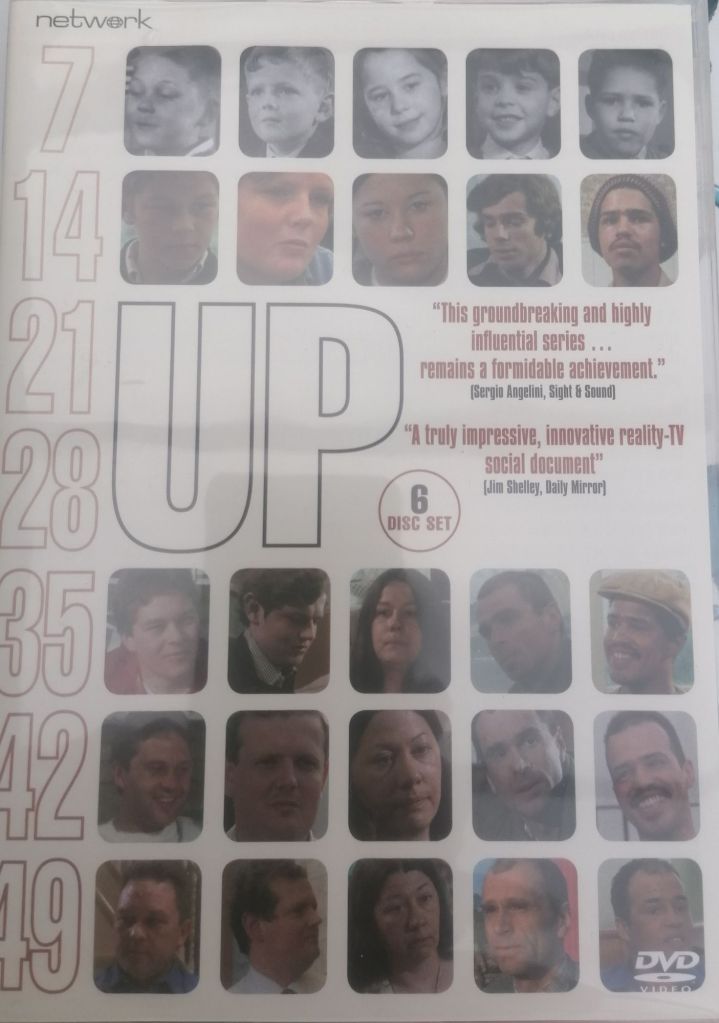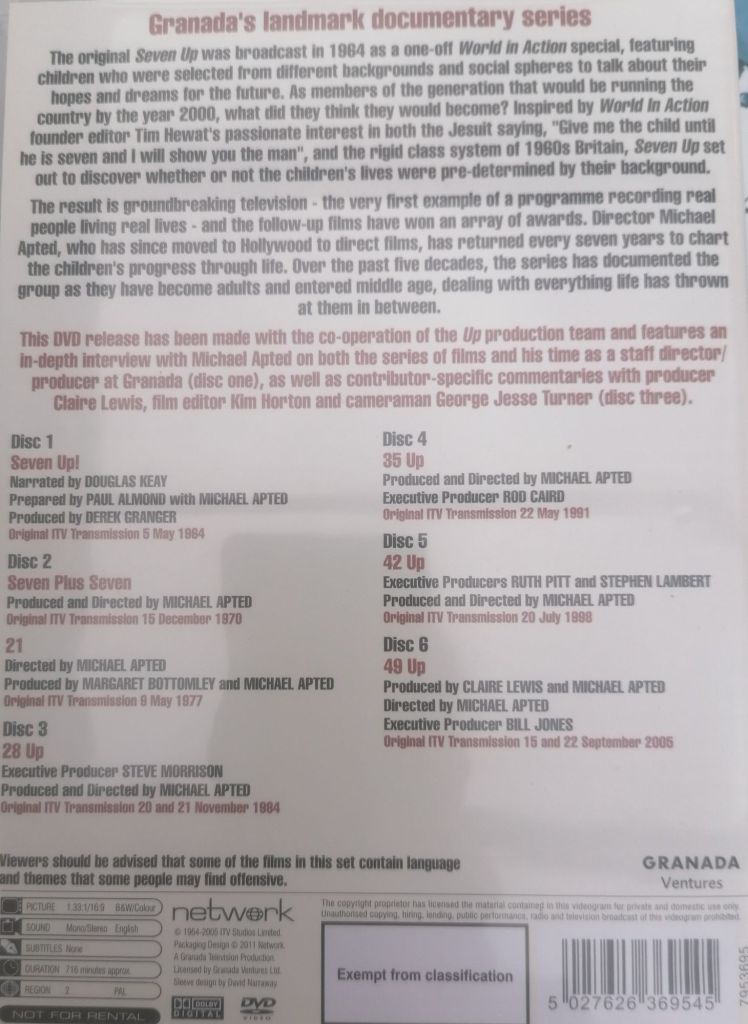7 Up TV Series Re-view Part 4 28 Up

28 Up saw two of the original 14 participants bow out, one temporarily, one permanently. Of the original three prep school boys, only Andrew took part. John said he had nothing to add to what he had said at 21, although he would return to the series 7 years later for 35 Up. Charles was a different matter. He had become an assistant producer at the BBC in the seven years since the previous programme. When he declined to take part, the producer Michael Apted rang him up and, by his own admission, ‘went berserk’ and completely destroyed the relationship he had built up with Charles over the previous programmes. Charles would make no more appearances in the programme and even tried to sue the programme makers to force them to remove all images of him from 49 Up onwards. He failed, but the programme did not mention him from then on, and he appeared only briefly in shots from the first three programmes of the three together. So, what of the remaining 12?

28 Up
Nick had moved to America by the time 28 Up was filmed. He had become a lecturer at University of Wisconsin specialising and lecturing in fusion science. Married to Jackie, he was building a career in the US after briefly working in the UK in the same field but concluding that the very low wages were a good indicator of the lack of importance attached to nuclear fusion in the UK. He is clearly very happy with his new lifestyle and extremely engaged with the academic side of life. When Jackie mentioned that she was able to work from home for about half the week as she had a computer at home, I just felt as though the US must have seemed light years ahead of the UK standard of living at the time. Given that 40 years ago the idea of working from home in academia was obviously widely accepted, it seems a great shame that it has become so controversial here and in the US in 2024. Jackie was clearly reluctant to be interviewed, but her guarded approach and comments about feeling so far away from family with so little opportunity to contact them apparently led viewers of the time to write letters about the marriage being doomed. She never appeared in the series again, but the fact that the partners of the original participants were becoming ‘fair game’ probably changed the nature of some of the interactions after this programme.
Tony had spent the seven years since the previous programme passing the Knowledge and becoming a London black cab driver and he had also married Debbie who had had two children by the time 28 Up came along. He really impressed me in this programme as someone who had become very comfortable in himself at work and at home. He spoke about education, which he had dismissed as unimportant seven years earlier, and admitted that it was a silly comment to make, expressing the hope that his children would make more of their own education than he had. He does however come out firmly against the idea of boarding school, saying that despite their other advantages those who are sent there lose out on so much family time, and that he as a Dad wants to be there to see every milestone of his children’s lives. Alongside his cab driving he was also training to become an actor after a couple of appearances as an extra. He was clearly not one to stand still, and his ebullience and humour were not only intact, but more obvious by the time he reached 28. You got the feeling that Debbie was perhaps effectively dealing with three ‘children’ at times (!) but they appeared to be very happy in their relationship. Particularly as he started from a lower base than most of the other participants, you could argue that Tony has been the most successful of the fourteen children up to this point, and he was definitely great fun to listen to.
Bruce, who was privately educated, was teaching mathematics in the East End of London when 28 Up was being filmed, ironically at Tony’s old school. He was clearly still very socially conscious at this point, having described himself as the only socialist in his village, and concerned about the inherent unfairness of life where opportunity comes much more easily to the upper classes. He sees his job in this instalment as a way of somehow ironing out the disparities and he has some choice words about the then Conservative government. Peter, who had also become a teacher made similarly disparaging comments, and those comments caused such a backlash in the tabloid press that he refused to come back to the series for nearly three decades. It was an unwitting, I think, insight into the influence of class that was the initial point of the series. Bruce got away with it because, I suppose, he was ‘one of us’ whilst Peter, a Liverpudlian of lower social status, was the chosen target because he was speaking out of turn about his ‘betters’. Well, that’s my take anyway!
Andrew, the remaining member of the trio of ‘posh boys’ had become a solicitor at the time of 28 Up and was married to Jane who described herself as a ‘down to earth Yorkshire girl’ in very cut glass tones! She was clearly from a similar social strata, but not, as she said herself, a ‘deb’! The two seemed to be very content both in their careers and their early married life and they already had a London flat as well as a country farmhouse that they were in the process of converting. Andrew always seemed a nice engaging personality, if quite reserved in front of the cameras, and in the way that he spoke you got the impression that he was getting more broad minded as the years progressed.
Paul and Symon, the two boys we first met at the charity boarding school when they were 7, could scarcely have had more divergent experiences in the next 21 years. Paul, now every inch an Aussie after living there for 20 years, had got married to Susie who had had two children, and now had his own business as a bricklayer. However, for me a couple of other elements of his life were of far more interest. Firstly, he was already a homeowner in a ‘working class suburb’ of Melbourne which looked every inch a middle class suburb to me and clearly part of the 80s version of the Australian dream that Erinsborough was based on. As with Nick in the US, you knew that there was no way he could have aspired to that standard of living in the UK had he stayed, something he somewhat uncomfortably admitted. Symon, on the other hand, was still working in the freezer store at Wall’s and had a wife and five children. He admitted that he had no drive to move or try for a promotion and was happy to see life chugging along. It left me wondering what would have happened if their life stories had been reversed. I got the impression that Paul would have succeeded in the UK but not reached the same level, while Symon would probably have been in a better situation but would almost certainly not have made as much of the opportunity. It makes you wonder how their basic natures and family backgrounds were part of the overall mix, as much as the differences between the ostensibly more egalitarian Australian society and the class bound UK.
Now on to Neil, the participant with the most extreme change of circumstances. After having dropped out of university, 21 Up found him squatting in London. By the time 28 Up came around he was living off grid in the Scottish Highlands in a caravan, relying on a combination of occasional work and social security benefits. He was clearly quite vulnerable in terms of his mental health, and it was very sad to see the happy seven year old two decades earlier become the withdrawn troubled young man of 28. It was quite riveting TV as he opened up on his regrets and his challenges in a way that appears to modern eyes to be very unusual. He wasn’t doing it for publicity, he was genuinely thinking through things on camera with a cameraman in attendance and Michael Apted off screen asking the questions but otherwise staying silent as he expounded his ideas at length. When you compare it to modern TV which would be full of leading questions, mawkish background music and voiceover commentary that alters the feel of an entire situation, based upon the prejudices of the filmmakers, it truly is a different and much better form of documentary making. I’m not sure that we can put the process into reverse, but I would love to see the response of modern audiences to careful, sympathetic film making like this.
Now, we turn to the four young women who were part of the original 14 children. Sue, Lynn and Jackie are once again interviewed as a trio. It’s really interesting how these three young women have kept their same roles in the friendship with Lynn, still a school librarian and therefore appropriately, being the quiet one, Sue the seemingly happy go lucky member of the trio, and Jackie the outspoken and combative one. All three are, at the time of 28 Up, married with children and seemingly quite content, although unlike the male participants we don’t see them with their partners. Jackie comments on the sexist nature of the questions asked to the girls as opposed to the boys, a theme that she apparently returned to in future programmes. Lynn has not got a particularly prominent role in this programme, perhaps because her life was in a very similar position to how it had been 7 years earlier. There is, as Jackie observes, still this gender divide that the programme is guilty of in assuming that women will become wives and mothers and give up their employment.
Much to my delight, Suzy had turned things around by 28. The 21 year old chain smoker with a cynical view of marriage has been replaced by a happily married, effervescent young woman with a seemingly besotted husband, Rupert, and two children. She looks back with a mixture of sensitivity and humour at her younger self and although she still regards the whole programme as somewhat silly is far more at ease than we’ve ever seen her before. She and Rupert both boarded from a very early age, but when she is asked whether she might want the same for her children she says that it is far too early to live away from home. It’s interesting how she echoes Tony’s views in her very different way.
It was a fascinating two hours spent in the company of a dozen people who I have started to really invest in emotionally. I think that having watched the first four episodes in a month, I have seen patterns in the lives of these young men and women that have been fascinating and as someone who loves social history I have seen changes in views, surroundings and society at large that give snapshots of what the world was like in the 60s, 70s and 80s. It truly is the jewel in the crown of British television and I can’t wait to see these people at the age of 35 at the beginning of the 90s. See you next time!
